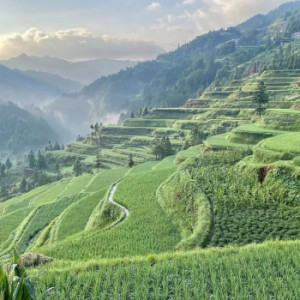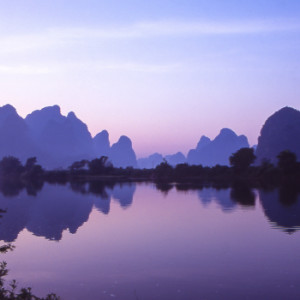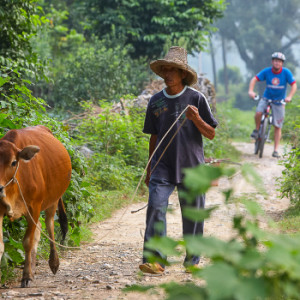
"Get off the beaten track in rural southern China: cycle through stunning limestone karst mountains, hike the cascading Longji Rice Terraces, raft and swim in mountain streams and meet welcoming local minority people."
Click image to start slideshow
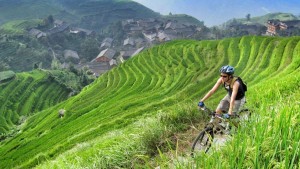

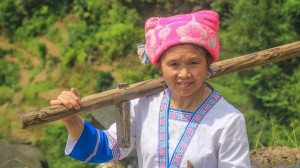
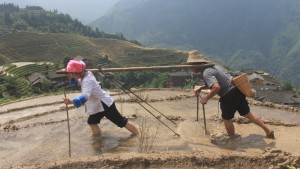
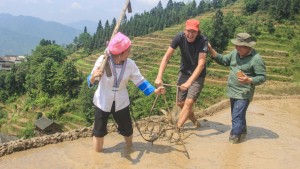
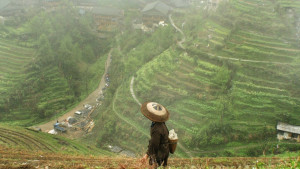

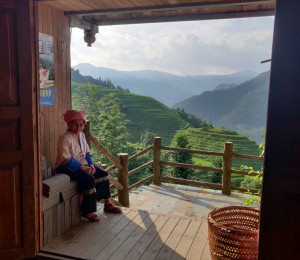
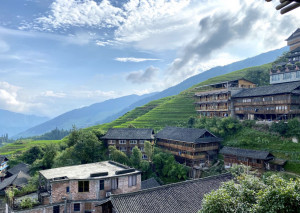
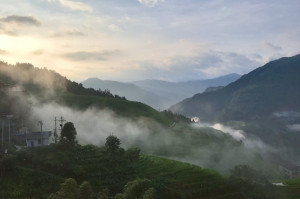
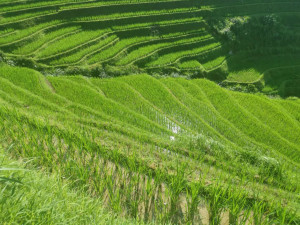
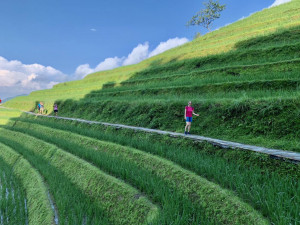
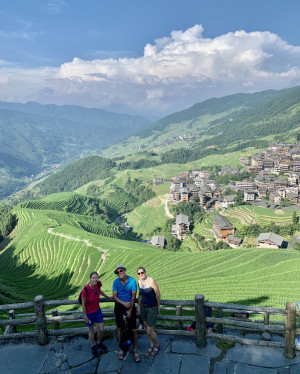
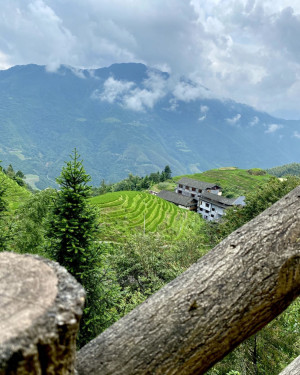
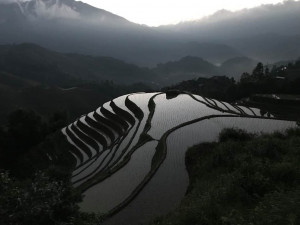
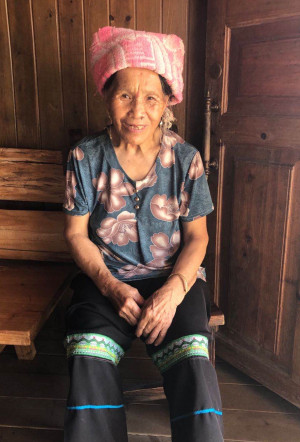
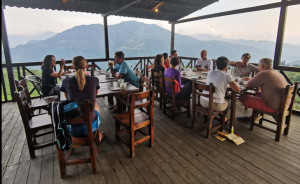
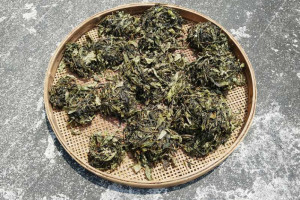
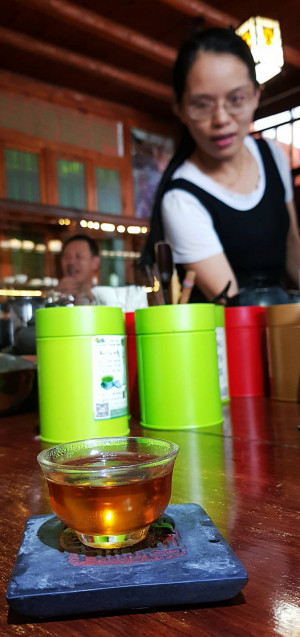

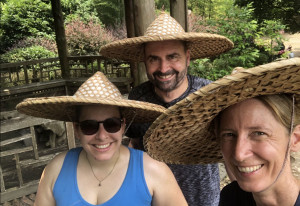
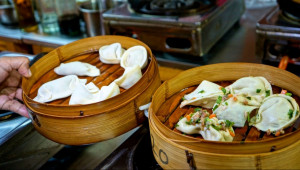
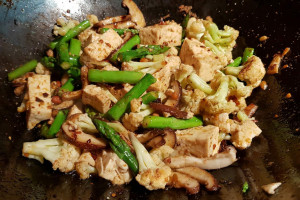
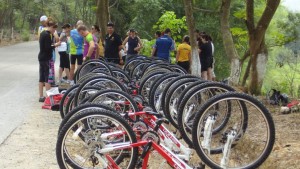
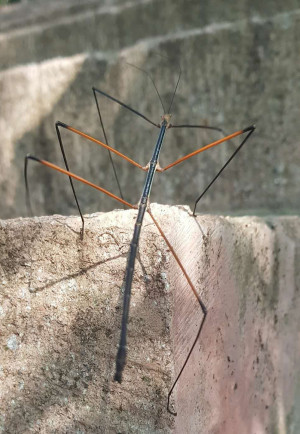
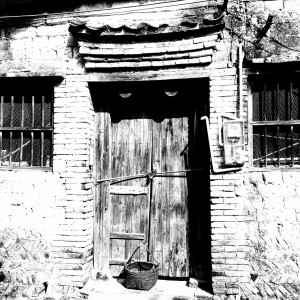
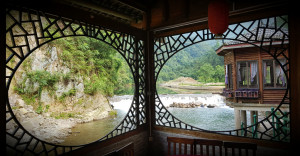
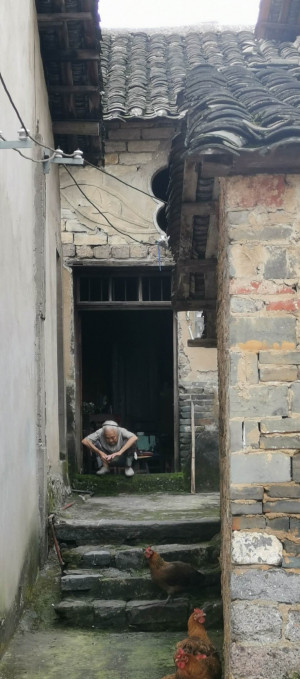


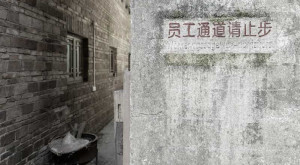
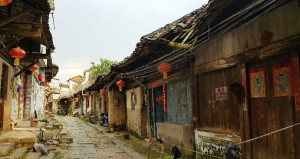
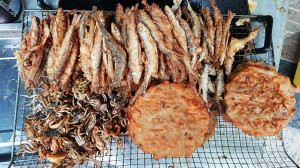
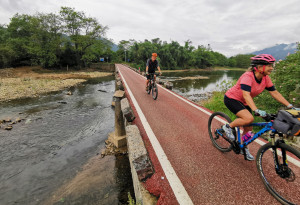
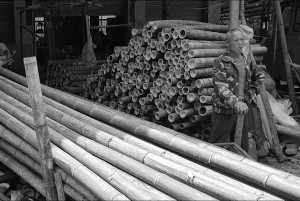
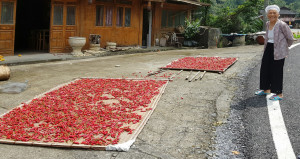
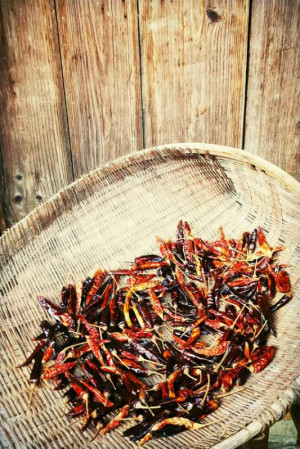
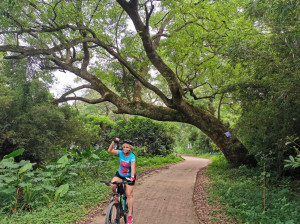
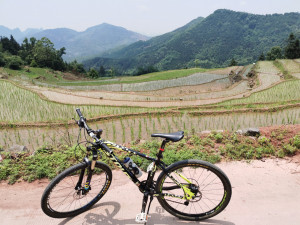
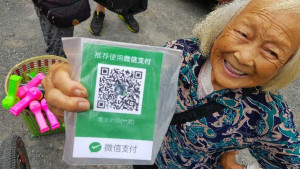
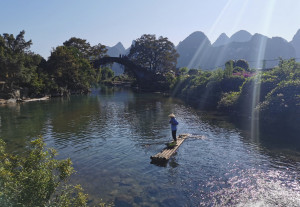
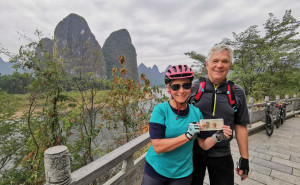
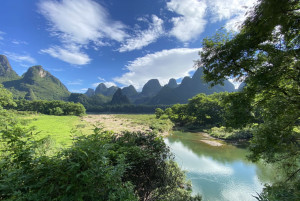
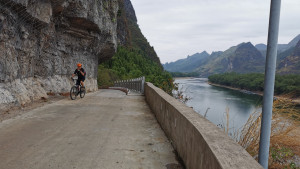
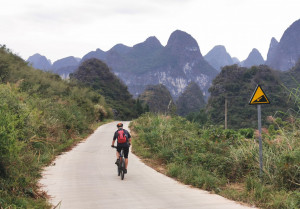
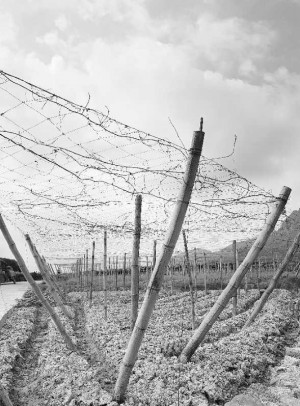
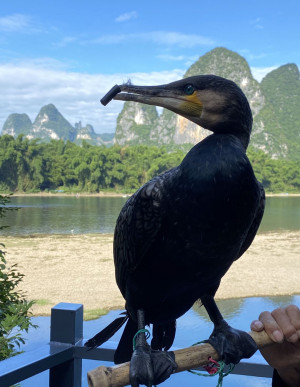
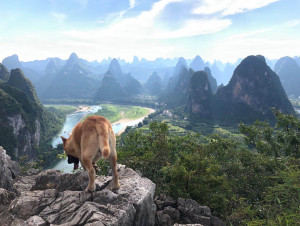
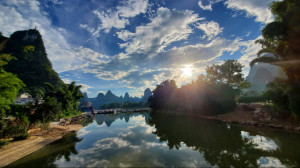
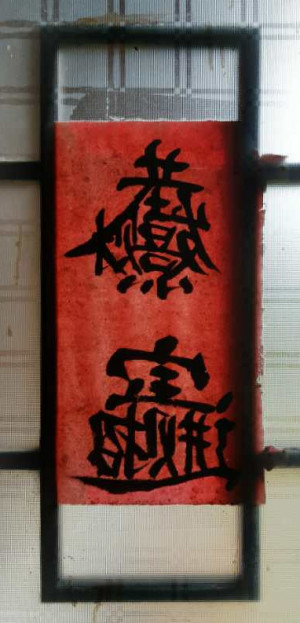
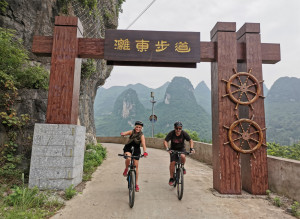
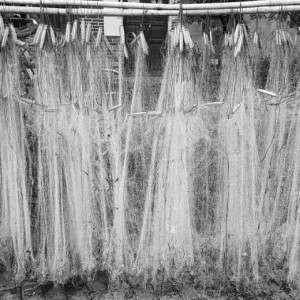
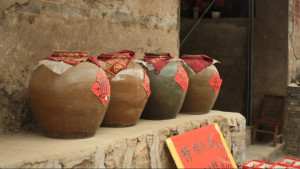
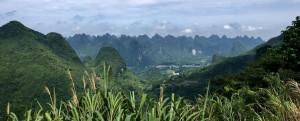
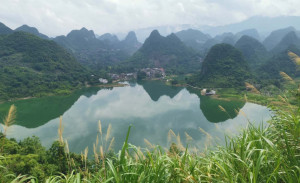
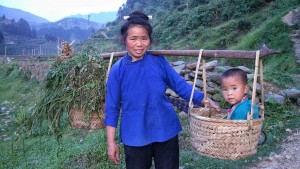

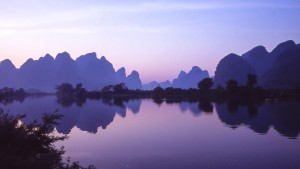


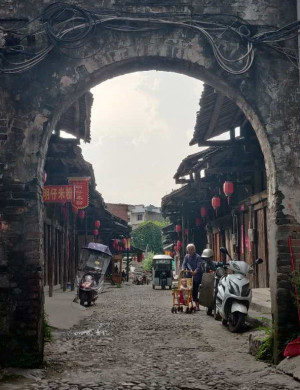
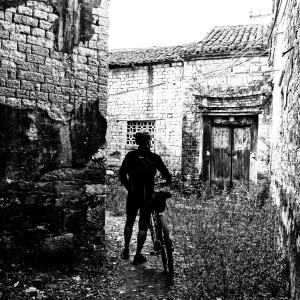
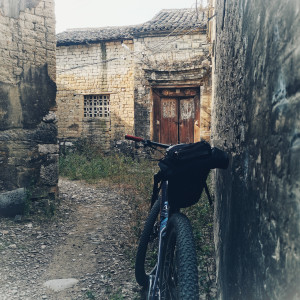
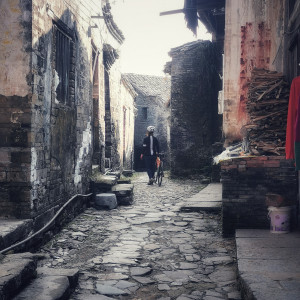
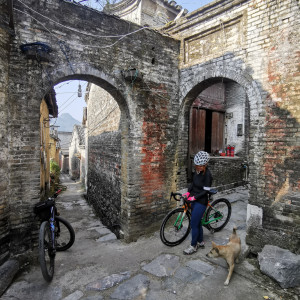
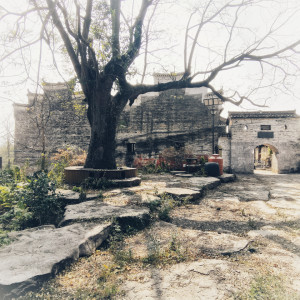

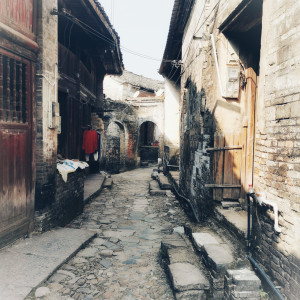
-
Day 1: Arrive Guilin - Transfer to Pingan in Longji Rice Terraces
DinnerWhether you’re coming into Guilin by train or plane we will be waiting for you – just keep an eye out for a sign with your name on it! The drive to our start point in the village of Pingan, nestled in the heart of the Longji Rice Terraces, will take around an hour. On arrival in Pingan, it's a 15 minute walk up to the guesthouse - we'll have porters on hand to help you with your gear if needed. Accommodation for the next two nights is in a local guesthouse with all amenities and some of the best food in the region. After check-in, and a brief group meeting to go over any questions you may have, you can head up to one of the viewpoints for sunset over the intricate network of rice terraces or relax on the balcony and admire the mountain vistas. We'll meet for a banquet dinner in the evening and celebrate the start of the adventure with some local specialities and perhaps some locally made rice wine!
The Longji rice terraces (龙脊梯田 – Longji Titian), meaning "Dragon's Backbone" rice terraces, are located in Longsheng county (龙胜) around 100km from Guilin. The terraces, also known as Longsheng rice terraces (龙胜梯田 – Longsheng Titian) are over 600 years old with their construction starting during the Yuan Dynasty (1271-1358) by the Zhuang and Yao ethnic minorities. The area of the rice terraces covers an incredible 65 square kilometres, all built by hand using buffaloes, horses and traditional tools that are still used today. There are three main areas centring on the Zhuang villages of Pingan and Longji and the Red Yao village of Dazhai. We'll be staying in Pingan and exploring the surrounds there as well as hiking to the areas oldest village, Longji, which has the largest group of traditional Zhuang stilt-houses in Guangxi.
The Zhuang (壮族) are indigenous to Guangxi and the largest ethnic minority in China. Also living in Yunnan, Guizhou, Hunan and Guangdong provinces, the Zhuang have their own distinct language and customs and are famous for their colorful embroidery. The Yao (瑶族) originally come from Hunan province and have spread across Guangxi, Yunnan, Guizhou and Guangdong provinces. The Yao are well known for their singing and bright clothing and, most famously, for the long hair of the women (often 2 metres in length) that is tied up in a large distinctive bun on top of their heads.
-
Day 2: Hike in Longji Rice Terraces
Breakfast, Lunch & Dinner 10 kmAfter breakfast on the balcony, we'll head up to the terraces guided by our local Zhuang host Keyin or his brother Yibeng. They were one of the first to build a guesthouse in Pingan and we've had a long friendship with them. They'll show us their section of the terraces where we have the opportunity to take part in some of the work that needs to be done - depending on the season that might mean planting rice, tending vegetables or harvesting - whilst learning about Zhuang cultural and village practices. We'll continue our hike up to the various viewpoints above Pingan before heading to Longji village on stone pathways through the rice fields. In Longji we stop for a local lunch a Zhuang farmers house before exploring the old wooden houses, stone bridges and ancient trees in this oldest village in the terraces. We'll return to Pingan with time to freshen up before dinner.
-
Day 3: Cycle to Miaoping - river rafting to Shiertan - 36km
Lunch & Dinner 36 kmOur first day on the bikes starts with a bike fitting and a briefing on what to expect on the road ahead. We start with a thrilling downhill for 6km through dozens of switchbacks, down the mountainside. We then follow a smooth twisting gentle downward ride for 11km along a small river, passing several Yao villages. After a short break we spend the rest of the morning on quiet sealed roads climbing gently up over 12km through shady pine and bamboo forests, tea plantations and small settlements, often catching views of villages perched improbably the hills across the deep valley. What follows is a long sweeping downhill through pristine countryside to our lunch spot after 36km. Being close to Guilin, delicious Guilin-style rice noodles are available everywhere and these hearty meals are perfect for biking. In the afternoon, we leave the bikes behind and hop aboard rubber rafts for a sometimes thrilling, sometimes serene, float down the river to our hotel on the riverside at Shiertan. Interspersed with some brumby rapids, the raft ride takes about one and a half hours on mostly flat water passing through ravines and by small villages. Arriving at the hotel you'll have time to shower and relax before dinner on the rivers edge.

For those not interested in rafting, you can do a further undulating 25km on the bikes through picturesque countryside scenery with one of our guides, leaving plenty of time to arrive at the hotel, freshen up and relax before dinner.
-
Day 4: Cycle to Qingshitan - 63km
Breakfast, Lunch & Dinner 63 kmBreakfast will be in the hotel overlooking the river and then it’s back on the bikes with a smooth downhill to Wantian village to check out locals going about their daily life; buying and selling in the colourful local market. One of the highlight rides of the tour takes us through farming communities on small, serene backroads and trails through vegetable and fruit orchards as we explore village farm life and old Han villages. At around 30km, we'll stop at Liu San Jie tea plantation for lunch where you see how tea is grown and produced. We'll settle in to learn about tea culture over a traditional tea ceremony before a banquet lunch. Our afternoon ride takes us on small backroads to Qingshitan Lake, where we cycle on it's fringes before descending to the rural plains below. We'll stop and visit Jiangtou Jiuwu ancient village, one of the more intact ancient towns in Guangxi, before heading to our hotel for the evening.

Jiangtou Jiuwu is an ancient town that was founded by Hunanese Zhou Dunyi (1017–1073), a famous literati, philosopher and scholar of Neo-Confucianism, during the Northern Song period of Chinese history. The town is made up of his descendants, many of who continued his scholarly ways, with a large number graduating the Imperial examinations and becoming officials and scholars. Today, the village is one of the better preserved examples of Ming and Qing style architecture, where wandering among the lanes and into the temples offers a glimpse into the distant past.
-
Day 5: Cycle to Daxu - 82km
Breakfast, Lunch & Dinner 81 kmAn epic day is in store today as we make to the Li River. Our first section of cycling will take us along flat countryside roads through rice fields, vegetable plots, citrus orchards and numerous villages; many with colourful murals on the roadside buildings. After stopping for a break at Lingchuan, we make our way across the Li River and along wetlands that are used for fish farming. We'll leave the Li River behind and climb up toward Changchongkou, following an ancient trading route that linked distant farming communities to the Li River which was the major transport route in the past. We'll stop in a tiny village for lunch, after which, there's a great walk to a nearby waterfall (and a refreshing dip if it's hot enough). The afternoon is a speedy (mostly) downhill to Xiong Cun village, one of Gunangxi's (and China's) more untouched ancient towns, where we'll stop for a stroll through the old streets. Then it's a riverside ride on small paths through rural landscapes in to Daxu Old Town, one of the regions more famous ancient villages. As it's a long busy day, we'll head straight for our hotel overlooking the Li River, leaving time for the Old Town to be visited the next day. Dinner is riverside with views over the River.

Xiong Cun is a relatively unheard of village that was once a prosperous trading town linking smaller remote villages and farming communities to the major ports on the Li River, such as Daxu in the south and Xingan in the north. Although it has a history of over a thousand years, the village, as it stands today, was built during the Ming and Qing dynastic periods. Many residents still live in the old houses and amble the narrow cobble lanes. Surrounded by mountains, rice and vegetable fields and interwoven with small streams and waterways, it's unrestored state and lack of the modern developers neon touch makes this one of the more authentic rural towns in China. Daxu Old Town has an even longer history with the earliest Zhuang inhabitants occupying the area as early as 200BC. It's heyday, like Xiong Cun, was during the Ming and Qing dynasties, when it was one of the richest ports along the North/ South trade artery that linked southern China with the North. Old flagstone streets, temples, courtyard houses and bridges are fine examples of what an ancient merchant port town would have looked like.
-
Day 6: Cycle to Xingping - 58km
Breakfast, Lunch & Dinner 58 kmAfter breakfast, we'll jump on the bikes and head into Daxu Old Town. We'll explore the old streets and meet the mostly old folk who still live in the old Qing brick and wooden buildings. Blue flagstone and river-rock cobble pave the streets and, as Daxu is quite well known, souvenir sellers vie for attention along with snack stalls, antique shops, art dealers, traditional medicine purveyors and juice bars. Our route takes us through town to follow a bike path along the famous Li River to quite near where the Li River cruses begin. On the bikes we'll have the serenity of watching the peaceful river life from the banks, away from the crowds, wending our way through bamboo groves and plantations of citrus, grapes and a myriad of vegetable fields. Our first big climb of the day takes us up high over the river and into the Southern China limestone karst mountain area designated by UNESCO for it's sublime beauty. At the top we'll stop for a coffee break: each day of cycling is punctuated by a coffee break featuring fruit and snacks, tea, and Chinese coffee to keep the legs pumping. A stunning series of long downhills and shorter climbs brings us to lunch in a rural farmers restaurant in the lowlands.
After lunch, we head for the hills again with a steep, but short climb taking us into mountain country once again. We'll be making our way to a mountain stream where we'll leave the bikes behind and hike upstream to a narrow gorge and waterfall for a refreshing swim. The last section of riding takes us downhill all the way into Xingping. After freshening up, we'll head into the old town for a banquet of local specialities.

Xingping, another river town located on the banks of the Li, has an old town that is archecturally Ming and Qing dynasty in style. The surroundings are some of the more beautiful in the whole region; the bamboo-lined emerald-green Li River curls around impossibly shaped and immensely imposing karst formations whilst the sun seems to find itself setting perfectly in the landscape for the photographers that make their pilgrimage there. Xingping sees quite a lot of tourists these days, many to take pictures with the view on the 20 yuan note behind them, but the area is easy to get lost in and avoid the crowds, even in the centre of town, where you can hike up Loazhai Mountain for some of the best views you'll see anywhere with few people around you.
-
Day 7: Cycle to the Yulong Valley - 38km
Breakfast, Lunch & Dinner 38 kmOur final day of cycling is definitely a highlight. We follow the Li River upstream for around 2km past the view made famous for being on the Chinese 20 yuan note. From here we load up the bikes onto a local ferry to cross the river, then back on the bikes we send our way through small villages all surrounded by immense karst mountains. A small back road route brings us up our first climb of the day, heading up into the hills for some of the finest views of the tour. We'll stop for a break at Xianggongshan Mt which has a lookout where you can aappreciate the enormity of the landscape: a forest of karst mountains disappearing in the distance over views of the Li River far below. We continue to ride along the ridgeline passing through citrus orchard countryside before heading away from the Li River and down to Baisha and onto the Yulong River Valley. We'll stop for lunch in a local farmer’s restaurant by the river, with views of the 600 year old Yulong Bridge, before a back road ride along the river to our guesthouse in Jiuxian Ancient Town. Our guesthouse for our last night, and celebration of the end of our adventure, is in the middle of the old town in wonderfully renovated traditional buildings: a fitting way to end our tour!

Jiuxian Old Town is one of the more famous villages in the region. Situated in the serene and sublimely picturesque Yulong Valley, it boasts some of the nicest converted traditional style accommodation anywhere in China, making for a rewarding way to appreciate the old archectecture and village life in an authentic setting.
-
Day 8: Departure Day
BreakfastToday is departure day and you are free to leave at any time. If you'd like to stay on in Yangshuo there are plenty of options for further activities so let us know if you need any help planning your stay.
A twist on one of our most popular China cycling tours features one day of hiking through the beautiful rice terraces of Longji and five days days of off-the-beaten-track cycling exploring the incredible natural beauty, history and culture of Northern Guangxi. We also include a white water rafting ride, hikes to secret waterfalls and some refreshing canyoning activities, so it's most suitable for those that like to be active. You’ll find yourself cycling on quiet country roads, hiking through rural mountain villages, exploring ancient river towns, cascading down mountain ravines on a raft, dipping into waterfalls, walking through markets and feasting on local delicacies. The cycling is outstanding, with a mix of challenging hills, long flats as well as some off-road to really get you into the countryside. It's a fully supported ride with guides, mechanics and a support vehicle to allow you to relax and enjoy the experience.
Getting There & Away
This trip starts in Guilin and finishes in Yangshuo, Guangxi Province, China. Guilin and Yangshuo are serviced through the airport in Guilin (Airport Code KWL). It is an international airport with connections across Asia as well as most cities in China. Yangshuo is 85 kilometres (one hour) from Guilin International Airport by car. Below are some of the main options for flights.
- Hong Kong (HKG) – China Southern Airlines, Dragon Air
- Bangkok (BKK) – Bangkok Airways
- Beijing (PEK) – Air China, China Southern, China Eastern
- Shanghai (SHA & PVG) – Air China, China Southern, China Eastern
- Guangzhou (CAN) - Air China, China Southern, China Eastern
- Kuala Lumpur (LCCT) – Air Asia
- Macao (MCM) ) - Air Macao
- Seoul (ICN) - Asiana Airline
- Singapore (SIN) - Jet Star
To check flight details, time and cost we can recommend Trip.com. It features all languages and currencies, is reliable, and you can pay by credit card.
Trains and buses to Guilin are available from almost anywhere in China. New high speed trains are a great option too with many connections throughout China to both Guilin and Yangshuo station and tickets can be purchased on Trip.com.
Transfers
Airport/ train station pick ups and drop offs are included in the tour price. Please make sure you give us details of your arrival and departure, including flight details, date and time, so we can arrange your transfers.
Tour Info Pack
Once we have recieved your booking and deposit we'll send you a Tour Info Pack that will include tour notes, training tips, preparation info and joining point instructions. If you have any questions about the tour at all please don't hesitate to contact us.
Additional Accommodation
Arriving early or want to stay on after the tour ends? No problem! Just let us know if you'd like to book extra accommodation in the tour hotel at either the start or finish of the tour and we will arrange it for you. Just include your request on the booking form.
Single Supplement or Single Room Request
Prices for our tours are based on twin share rooming arrangements. If travelling alone you will be paired with someone of the same sex. If you require your own room, just let us know, and this can be arrange for a supplemental fee.
-
How difficult is the tour?
For this tour you need to be of a reasonable level of fitness. There are hills on 4 of the 5 days of cycling, most are relatively short but there are some longer climbs. There are also long descents on twisting switchbacks at times so you need to be reasonably confident on a bike and in your ability to control it. Most of the tour is on quiet sealed backroads, with very small sections where we'll encounter some traffic. We may also ride on small sections of dirt and cobblestone. The longest day is 82km so if this seems within your fitness range you will be able to complete this tour.
We do break up the cycling with coffee and snack breaks and allow time throughout to explore or interact with anything interesting that comes our way. The rides aren't competitive: our focus is on the experience of biking and exploring the scenery and culture that we cycle through rather than getting to the destination as soon as possible.
Off the bikes, we'll provide opportunities to explore on foot with some easy hiking on stone and dirt trails and also along mountain streams so it's ideal to be good on your feet too!
A support vehicle is provided also, which will carry luggage and supplies and is available for anyone who wishes to take a ride.
-
Is there a support vehicle?
Yes. A support vehicle will carry all our luggage, supplies and you too, if needed!
-
Is the tour a private tour?
It can be! Generally, we'll advertise dates on our website that are open for the public to join but if you want to travel on other dates, or have a group already, just contact us and we can arrange a private tour for you.
-
Can we change the itinerary or customise the tour?
Not for publicly listed dates, but if you have your own group or date in mind, Yes. If you want to make a private booking we can help design a tour that suits you. You may have ideas based on any of our tours or something in mind that you can't find on our website. Just get in contact with us and let us know what you have in mind and we'll try our best to make it happen!
-
Do you cater for vegetarians?
Yes we do! If you have any dietery requirements just let us know when you book in the space provided (Additional Requests). For any severe alergies or other conditions it is best that you let us know in advance so that we can prepare and/ or advise you on what we can provide or what you might need to bring so that are well catered for.
-
What about Covid 19?
Covid restrictions have passed for most countries and it is now possible to obtain tourist visas for China. For China you may need to provide a personal Covid test within taken 24 hours before your departure, these are only checked randomly, and can also be taken on arrival.
During all our tours we take care to avoid any transferring of any viruses, such as Covid, through providing hand sanitisers and minimising exposure. As with any illness, all care will be made for the participants well being during the tour and we will help with any arrangements that need to be made if the participant needs to leave the tour (this will be at the cost of the participant). Costs for unused segments of tours cannot be refunded, for any reason, as all tour costs are paid in advance.
-
How to I make a booking and payment?
Simply go to the "Dates" section of the tour page and click on the "book now" button, or click on "book" on the website header and select your preferred tour and departure date. If you are booking onto an on demand tour and have your own dates in mind there will be an facility for you book here too.
Before you book, we recommend that you read through the tour details and our booking terms and conditions. You can contact us about the trip if you have any questions at info@bikeasia.com or set up a time to chat about the tour.
Upon completion of your booking form we’ll send you an acknowledgement email and invoice for a deposit. All long trips (7 days or more) require a deposit of 300USD to guarantee your place. Trips departing within 60 days at booking will require full payment. Once your deposit is received, we’ll also send you a pre-trip information pack that will give you added information about the tour, the region you’ll be travelling through, a checklist of things to prepare, suggestions for packing, training tips and more. For shorter trips and day tours we require full payment 30 days prior to the commencement of the tour or as soon as convenient if booking within 30 days of departure.
Payments can be made on credit card via Paypal or through a direct bank transfer in most currencies. Information on payments will be present on your initial deposit invoice. Paypal payments will incur a 4% fee.
| Start Date | End Date | ||
|---|---|---|---|
| Choose your own date | Book Now | ||
Contact us for customised or private tours.
Tour Stats
- China
- 8 days
- Cycling Tour,Multi-activity,Family Friendly
- 3
- 277 km
- 2 - 16 People
- 1425 USD
- 245 USD (single supplement)
Highlights
- Cycle stunning, quiet, rural southern China back-roads and trails
- Hike the extraordinary Longji - Dragon’s Backbone - Rice Terraces
- Meet local Yao, Miao and Zhuang ethnic minorities
- Raft down an thrilling ravine
- See the UNESCO listed sublime Southern China karst mountain scenery
- Visit and stay in centuries old Ming and Qing dynasty era villages
- Dip into a secluded waterfall
- Sample sumptuous local food
- Learn about local history and culture
- Experience rural Chinese farm life
What's Included?
- 7 nights accommodation on a twin share basis in local hotels and guesthouses with all amenities
- All meals as listed in the itinerary
- Coffee, water and snacks provided on all cycling days
- Airport or train station return transfers
- Support vehicle(s)
- Entry tickets as listed in the itinerary
- Bike Asia cycling/hiking guide(s)
- Excellent quality mountain bike
What's Not Included?
- Airfares
- Visas
- Insurance
- Tps, gratuities and personal expenses

